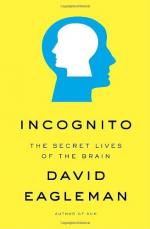
|
| Name: _________________________ | Period: ___________________ |
This test consists of 5 short answer questions, 10 short essay questions, and 1 (of 3) essay topics.
Short Answer Questions
1. What assumption is at the core of the American legal system?
2. What proved difficult in programming robots?
3. From what does Eagleman say our ultimate behavior springs?
4. What do newborns seem to recognize?
5. What were men then shown for a longer period of time?
Short Essay Questions
1. What does Eagleman say about the abilities of a bloodhound?
2. How does a rat react to conflicting choices?
3. What example does Eagleman cite to demonstrate the difference between the rational and emotional mind?
4. What does Eagleman say is hard wired into our brains?
5. Explain the study that was performed on how men rate a woman's attractiveness.
6. How does Eagleman use an example of early robotics to illustrate how the mind may be divided?
7. What does Eagleman say about a man named Alex?
8. What does Eagleman say about free will?
9. How does Eagleman compare the conscious mind to our senses?
10. What does Eagleman have readers consider about Whitman?
Essay Topics
Write an essay for ONE of the following topics:
Essay Topic 1
This assembly of competing routines is what makes up most of the activity of our brains, and our conscious mind, as is demonstrated in brains where these competing processes have been interrupted or disconnected, is mostly at the mercy of our unconscious processes. Eagleman presents the results of experiments that suggest that our conscious mind will even fabricate reasons for our actions after the fact when we cannot tell what our true motivations are.
1. There is a saying that we do not really look at pros and cons for a decision but instead make the decision unconsciously and then justify our decision with pros and cons. Discuss this idea bringing in the examples Eagleman gives.
2. Do you think most of the time a person does not know his or her true motivations for behavior? Why or why not? Use examples from your own life and Incognito to support your reasoning.
3. Discuss an incident in your life where after it happen you could not understand why you said or did what you said or did. How does that incident relate to Eagleman's assertion about unconscious control of people's lives? Use examples from your own life and Incognito to support your reasoning.
Essay Topic 2
There are ways to measure how our unconscious minds affect our conscious thinking even without our knowing it, Eagleman explains. For example, a person may consciously profess to have no prejudicial feelings about people of a certain race, but experiments that ask them to associate certain words such as "like" or "dislike" with photographs or words describing different races or creeds can reveal that they may move slightly toward the "dislike" option before choosing "like". This reveals a conflict between the unconscious and unconscious minds, Eagleman claims.
1. Do you think you could have unconscious feelings, such as prejudice, of which you are unaware? Why or why not? Use examples from your own life and Incognito to support your answer.
2. Discuss what conflicts might rise between the unconscious and conscious mind when you decide not to study for a test. Use examples from your own life and Incognito to support your answer.
3. Do you think the unconscious mind always makes the best decisions over the conscious mind? Why or why not? Use examples from your own life and Incognito to support your answer.
Essay Topic 3
Another set of conflicting motivations in the human mind is the rivalry between short term and long term desires, Eagleman argues. He presents several examples of people acting in ways that serve a long-term interest and protect them from the their short-term tendencies. A Christmas club is one such example, where people put money aside each month and then have it returned at Christmas time for purchasing gifts. These kinds of self-bargains are called "Ulysses contracts" after the classical figure Ulysses who had himself lashed to the mast of his boat so he would not be persuaded by the beautiful song of the sirens to steer his boat into the rocks.
1. Why do you think it is important to learn how to delay gratification? Use examples from your own life and Incognito to support your reasoning.
2. What do you think might be the difference in delaying short term goals between a child of 10 and an adult? Use examples from your own life and Incognito to support your reasoning.
3. Discuss an example in your own life where you did or did not delay an immediate desire in order to achieve a long term goal. How did this incident relate to one of the examples Eagleman gave?
|
This section contains 1,445 words (approx. 5 pages at 300 words per page) |

|




